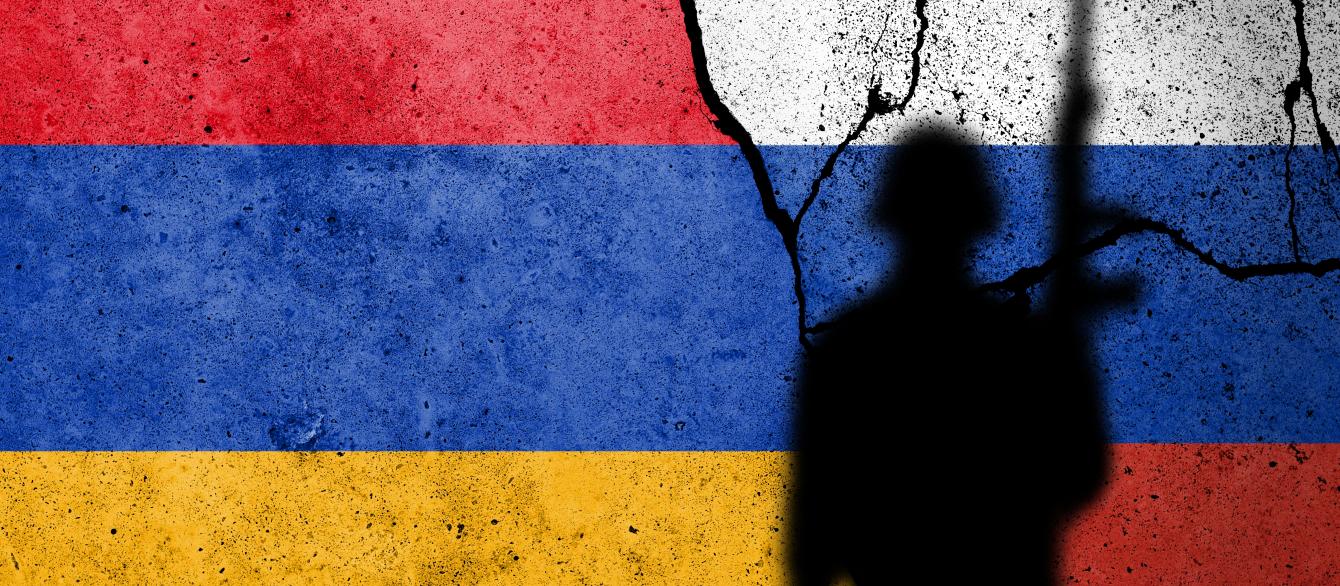This article originally appeared on the RFE/RL website.
Gyumri, ARMENIA — When Russian President Vladimir Putin visited his country’s military base here in 2013, he struck a confident tone. “Russia is never going to leave here,” he said. “On the contrary, we are going to strengthen our positions here.”
These days, though, Russia’s position in Armenia is looking shakier than ever.
Armenians’ faith in their centuries-old alliance with Russia is at a low point. Armenian officials are talking increasingly openly about breaking their security ties with Russia, and have begun taking the first steps in that direction, evicting the Russian border guards who have been providing security at Yerevan's international airport since the 1990s. At the same time, Yerevan has been making unprecedented overtures to the West, including mooting the possibility of applying to join the European Union.
But at the eye of this geopolitical storm, Russia’s 102nd Military Base in Gyumri — the weightiest element of the two countries’ security partnership — appears as firmly rooted as ever.
The base’s tanks, jets, and guard towers amount to a concrete manifestation of Armenians’ traditional trust in Russian protection against Turkey. The several thousand Russian soldiers and officers have long been part of everyday life in the city, Armenia’s second-largest.
And even as speculation mounts about possible geopolitical pivots, the base illustrates the difficulties that Armenia would face in trying to execute a dramatic shift in its foreign policy. The lease contract for the base expires only in 2044, and neither opponents nor supporters of the base see much likelihood that it will leave before then.
“We’re happy with them,” said the Armenian proprietor of one shop close to the base, who asked that his name not be used because of the sensitivity of the subject. “There are some people in Yerevan who want them to leave, but we in Gyumri want them to stay,” he said.
Decaying Shield
The base’s main function is evident from its location: on Gyumri’s western edge, less than 10 kilometers from the border with Turkey, Armenia’s perennial foe.
Armenians have long looked to Russia for protection against Turks, and Gyumri has played a critical role in that defense. The handsome black stone buildings that grace the city’s distinctive historic center were built in the 19th century, when Gyumri (then known as Alexandropol, after Tsar Nicholas I’s wife) was a key military outpost in the Russian Empire’s wars against the Ottoman Empire. Under the Soviet Union the city’s name was changed to Leninakan, but its defensive significance — in one of the few places where the U.S.S.R. directly bordered a NATO country — remained.
Following the collapse of the Soviet Union, poor and newly independent Armenia again felt vulnerable next door to its powerful, far larger neighbor Turkey. Founded in 1941, the 102nd Military Base survived the Soviet Union’s demise before receiving its current name, along with a 25-year lease, in the mid-1990s. Russian border guards were also stationed along Armenia’s frontiers with Turkey — and Iran — where they remain to this day.
The Russian presence here makes the Armenia-Turkey border effectively “the last piece of the Iron Curtain,” said Levon Barseghian, the head of a local journalists’ organization, Asparez.
Today, a sign at the main entrance of the base features a stern portrait of Putin and a quote: “The growing military power of Russia is a reliable guarantee of peace on our planet, as this power maintains and will maintain the strategic balance of forces in the world.”
That boast notwithstanding, the base does not evince much Russian power. The walls that prevent visitors from entering are rough concrete topped by patched-together barbed wire.
At an adjacent housing district owned by the Russian state, the facades of the modest four-story apartment buildings are crumbling and the roads are unpaved, their ruts turning to thick mud in the rain.
“This is a military object, you need to be ready for anything. And look at the buildings, the fences, the barbed wire — you could shoot a film set 30, 40, 50 years ago there,” said Seyran Martirosian, a local human rights advocate and opponent of the base.
“They say this is a guarantee of our security. Then why aren’t they modernizing and improving this guarantee?”
Much of the military hardware at the base is older generation: T-72 tanks, S-300 air defense systems, and MiG-29 fighter jets.
“It never had the capacity to fight the Turkish armed forces, the resources there are pretty limited: about four or five thousand servicemen there, 80 tanks,” said Leonid Nersisian, a military analyst at APRI Armenia, a Yerevan-based think tank. “It is more for showing the Russian flag politically.”
The political significance of the Russian flag in Armenia, however, is also declining.
Armenia’s faith in Russia’s security guarantee started to wane in 2020, in the second war with Azerbaijan over the Nagorno-Karabakh region. While that conflict took place on territory internationally recognized as Azerbaijani — thus not technically triggering Russia’s mutual defense obligations — many Armenians nevertheless considered Russia’s position during the conflict too evenhanded for a country that was supposed to be their ally.
Still, early after the war, Armenia sought to deepen the military alliance; then-Defense Minister Vagharshak Harutyunian said in February 2021 that Armenia would welcome an expansion of the Russian base and deployment of some of the troops to the border with Azerbaijan.
Russia now maintains a battalion group in the city of Goris, near the border of Azerbaijan, established to support the 2,000-strong Russian force that was deployed to Karabakh under the cease-fire agreement that ended the 2020 war. Russia has also set up new border posts all along the southern part of the Armenia-Azerbaijan border.
Real strain in the Armenia-Russia relationship started shortly after Russia’s full-scale invasion of Ukraine in February 2022 once Azerbaijan started making incursions and advances into territory that was supposed to be secured by Russian troops. Azerbaijan also repeatedly attacked and advanced into territory in Armenia proper, which Yerevan argued should have triggered the mutual defense provisions of the Russia-led Collective Security Treaty Organization (CSTO). In all these cases, though, Russia has proven unwilling or unable to push back.
Armenian officials have become increasingly critical of their nominal Russian allies. Pashinian said in interviews that the alliance with Russia was a “strategic mistake” and that, “unfortunately, we have not seen the advantages” of the Russian base in Gyumri.
In recent weeks, the harsh words have started to turn to action. Armenia said it has asked the Russian border guards who provide security at the Yerevan airport to leave by Aug. 1. (Russian officials have responded cautiously to those statements; Kremlin spokesman Dmitry Peskov said merely that “contacts” between the two sides on the issue are ongoing.) Pashinian has also said that the country is considering formally leaving the CSTO and that it has already effectively “frozen” its participation in the group.
To many, it looks like the beginning of a more dramatic shift.
“This is the [Pashinian government’s] first major unfriendly step: It hints that we are not quite welcome in Armenia anymore,” Viktor Bondarev, the first deputy chairman of the Russian Federation Council’s defense committee, said after the announcement about the airport security. “In effect, this is Armenia’s slow and steady slide toward unfriendliness.”
The effort to evict the border guards from the airport was just one of “a whole series of unfriendly steps” that risks causing “irreparable damage” to Armenia-Russia relations, Russian Foreign Ministry spokesperson Maria Zakharova said.
From Friend to Foe
The tumult of the past few years has led to radical shifts in Armenian public perception of the country's security threats.
In a poll released in early March, the International Republican Institute found that Armenians see their ties with Russia as comparable to those with Turkey. The poll found that 66% of Armenians described relations with Russia as “bad,” up from 6% in 2019. As for relations with Turkey, barely more Armenians — 69% — described them as “bad.” In 2019, that figure was 98%.
Respondents also saw Russia as only their fourth most important security partner, behind France, Iran, and the United States.
In Gyumri itself, opinions on the base appear to be mixed. Many appreciate the economic benefits it brings to the city; Russian soldiers, officers, and their families shop in the stores and eat in the restaurants. “They spend their money in the shops and cafes here, so we don’t see anything bad about it,” said the owner of one shop across the street from the base. He chalked up opposition to the base to “anti-Russia propaganda.”
One man selling used cell phones at Gyumri’s covered central bazaar said that he had lost his faith in Russians as protectors. “They were supposed to protect us” in Karabakh, he said. But that didn’t change his opinion about the base in Gyumri. “The base has been here for a long time and it doesn’t bother anyone,” he said.
© 2024 RFE/RL, Inc. Used with the permission of Radio Free Europe/Radio Liberty.






